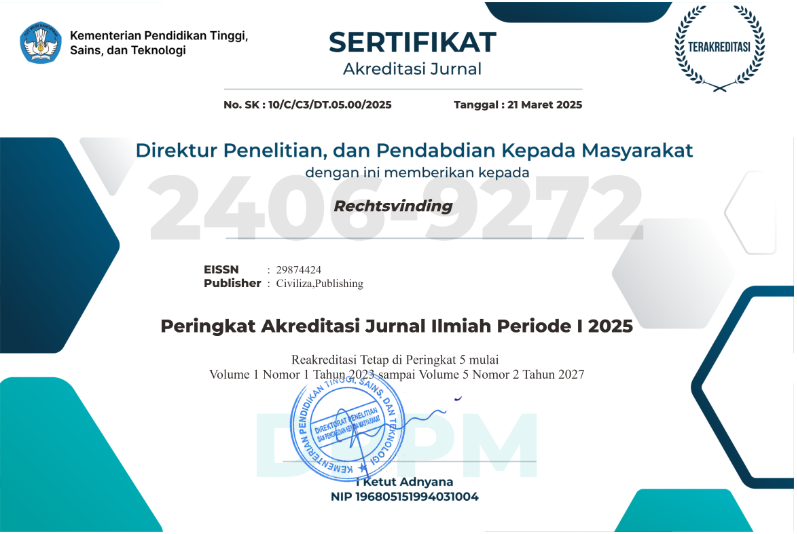TNI AL Authority as Maritime Crime Investigator in Securing Indonesian Waters
DOI:
https://doi.org/10.59525/rechtsvinding.v2i1.355Keywords:
Authorities, Investigators, CrimeAbstract
This article aims to determine the authority of the Indonesian Navy as investigators of criminal offenses at sea, in line with their role in law enforcement in Indonesian waters. It examines the constraints faced by the Navy in law enforcement efforts and explores government measures to streamline these duties. The research method is normative legal research, which includes collecting, processing, and analyzing legal materials. The descriptive nature of this study connects factors with statutory regulations, theories, and expert opinions. A normative juridical approach is utilized, focusing on literature examination. The research concludes that the Indonesian Navy's authority as investigators in securing Indonesian waters is attributive, inherent to their office. From a constitutional law perspective, this attribution reflects the power of government organs to operate based on authority established by lawmakers, grounded in the constitution or legislation. According to the Law of the Republic of Indonesia Number 34 Year 2004 on the Indonesian National Armed Forces, Article 9, the Navy's role as law enforcement and security officers in Indonesian waters is hampered by unclear regulations. The Navy lacks authority to investigate all legal violations at sea, leading to overlapping law enforcement due to conflicting regulations that grant attributive authority.
References
Bernard Kent Sondakh, 2004, Pengamanan Wilayah Laut Indonesia”, Jurnal Hukum Internasional, Fakultas Hukum Universitas Indonesia, Jakarta.
Boer Mauna, 2006, Hukum Internasional, Peranan dan Fungsi Dalam Era Dinamika Global, Alumni, Bandung.
Diah Restuning Maharani, Teori Kewenangan, http://www.scribd.com/doc/43230805/Teori-Kewenangan#scribd.
Didik Heru Purnomo, 2014, Pengamanan Wilayah Laut Indonesia, Jurnal Hukum Internasional.
Joko Sumaryono, 2007, Forum Koordinasi dan Konsultasi Operasi Keamanan Laut dan Penegakan Hukum, Majalah Patriot.
Joshua Ho, 2004,The Shifting of Maritime Power and the Implications for Maritime Security in East Asia, Institute of Defence and Strategic Studies, Singapore.
Lufsiana, Konflik Kewenangan Penegakan Hukum Perikanan, http://Artikelcakrawala/search/TNI-AL/.
Lutfi Effendi, 2004, Pokok-pokok Hukum Administrasi, Edisi pertama Cetakan kedua,Bayumedia Publishing,Malang.
Philipus M. Hadjon, 2001, Pengantar Hukum Administrasi Indonesia, Cetakan ke Tujuh, Gadjah Mada University Press,Yogyakarta.
Philipus M. Hadjon, 2005, Pengantar Hukum Administrasi Indonesia, Gadjah Mada University Press, Yogyakarta.
Satjipto Rahardjo, Membedah Hukum Progresif, Kompas.
Sayidiman Suryohadiprojo, 2013, “Keamanan Laut dan Tanggung Jawab Indonesia: Tantangan dan Kendala”, Makalah TNI-AL yang disampaikan pada Lokakarya Hukum Laut Internasional, 13-15 Desember 2013,Yogyakarta.
Sayidiman Suryohadiprojo, Kemaritiman Indonesia, http://sayidiman.suryohadiprojo.com.
Slamet Soebiyanto, 2007, Keamanan Nasional ditinjau dari Perspektif Tugas TNI Angkatan Laut, Majalah Patriot.
Tamara Rhenee See, 2004, Maritime Piracy in Southeast Asia: Challange and Opportunities for Intra-ASEAN Cooperation, ISEAS.
Undang-undang No. 8 Tahun 1981 tentang Hukum Acara Pidana.
Undang-undang No. 2 Tahun 2002 tentang Kepolisian Negara Republik Indonesia.
Undang-undang No. 34 Tabun 2004 tentang Tentara Nasional Indonesia. Undang-undang No.6 Tahun 1996 tentang Perairan Indonesia.
Peraturan Pemerintah No. 27 Tahun 1983 tentang Pelaksanaan KUHAP Beserta Penjelasannya.
Peraturan Presiden Nomor 178 Tahun 2014 tentang BAKAMLA.
Downloads
Published
How to Cite
Issue
Section
License
Copyright (c) 2024 Irwan Triadi, Muhammad Fadhil Ardian

This work is licensed under a Creative Commons Attribution 4.0 International License.








